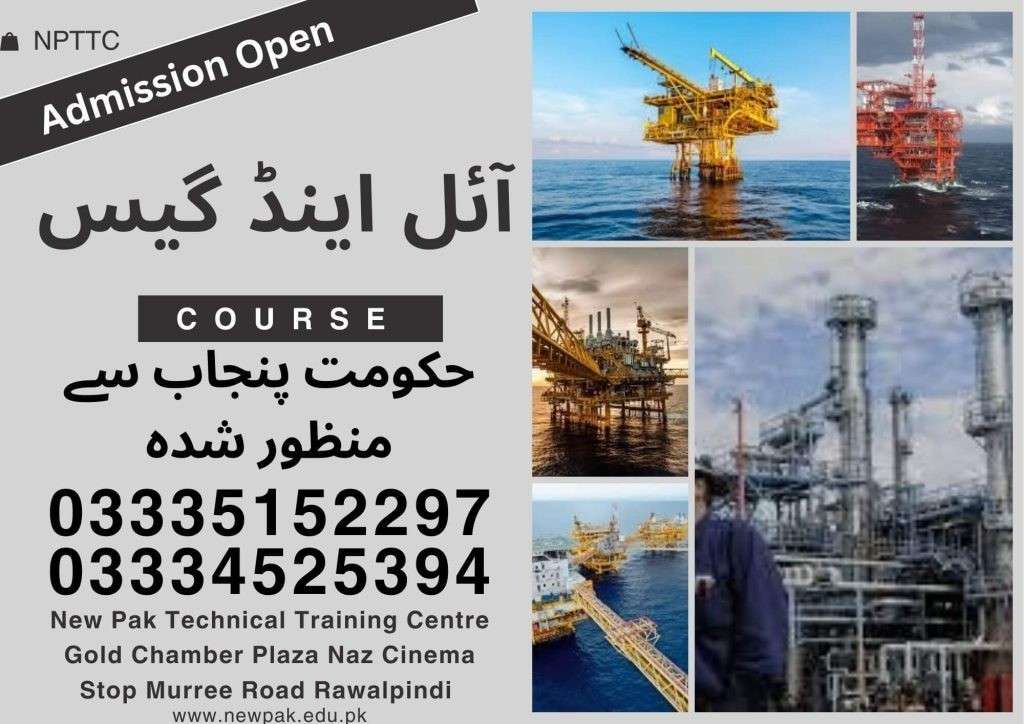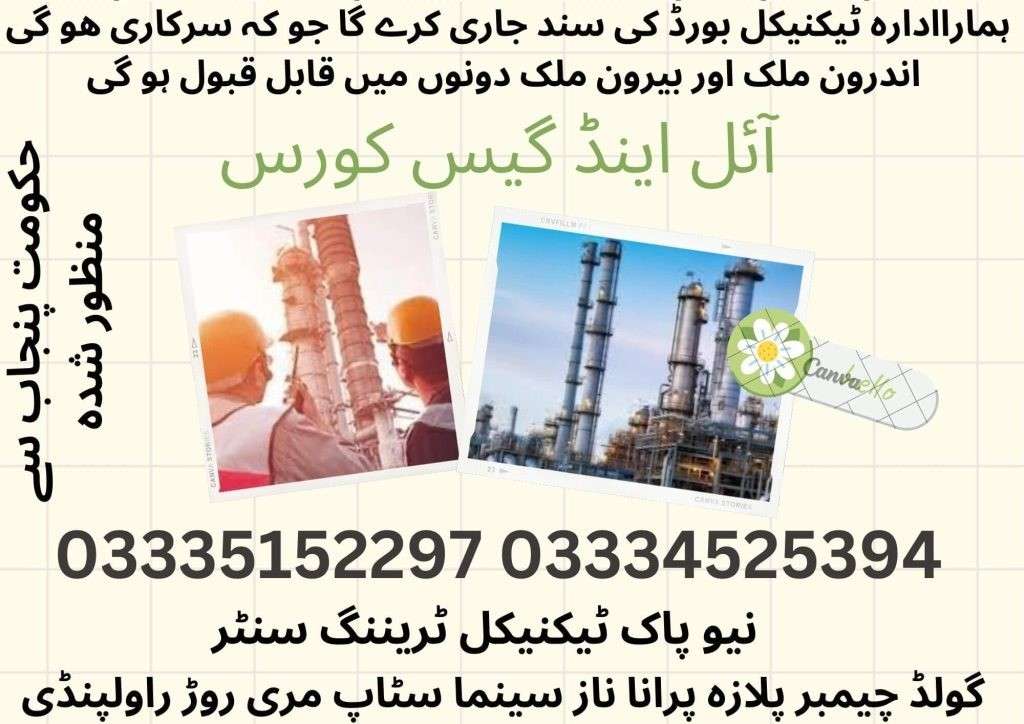
Oil and Gas Course in Rawalpindi Islamabad
The Oil and Gas Diploma (OGD) at New Pak Technical Training Centre in Rawalpindi introduces students to the fundamentals of the oil and gas industry. The course explores energy demand, environmental impact, and the technologies used in exploration, drilling, production, and refining.
Students gain hands-on understanding of how professionals locate oil and gas reserves, apply extraction methods, and convert crude oil into usable products. This industry-focused program also supports those pursuing careers through oil and gas management courses or specialized gas training courses.
Course Overview
The 6-month OGD (Oil & Gas Diploma) offers essential knowledge of the industry through topics like exploration, drilling, production, refining, and HSE, making it ideal for those seeking foundational oil and gas training courses. The 1-year advanced version extends into petrochemicals, enhanced recovery, unconventional resources, and digital oilfield technologies, positioning learners for roles in oil and gas management. This program is part of professional certification courses in oil and gas, designed to support career entry and advancement in the sector.

Course Duration
06 | Months
- Introduction to the Oil & Gas Industry
- Exploration Techniques
- Drilling Techniques
- Production Techniques
- Refining and Gas Processing
- Health, Safety & Environment (HSE)
01 | Year
- Oil & Gas Industry (Advance)
- Exploration Techniques
- Drilling Techniques
- Production Techniques
- Refining and Gas Processing
- Health, Safety & Environment (HSE)
- Petrochemicals and By-Products
- Enhanced Oil Recovery (EOR)
- Unconventional Oil and Gas Resources
- Digital Oilfield Technologies
- Case Studies and Field Practices
- Career Preparation and Industry Roles
Course Outline (6 Months)
Introduction to the Oil & Gas Industry
Month 1
- Overview of the oil and gas sector
- Industry structure: upstream, midstream, downstream
- History and evolution of oil and gas technologies
- Importance in global energy production
Exploration Techniques
Month 2
- Seismic surveys
- Gravity and magnetic surveys
- Basics of reservoir geology
- Tools and technology for exploration
Basic Drilling Techniques
Month 3
- Rotary and directional drilling
- Onshore vs offshore drilling methods
- Drilling rig components and operations
- Safety practices in drilling
Well Production Techniques
Month 4
- Primary, secondary, and tertiary recovery methods
- Artificial lift systems (e.g., pumps, gas lift)
- Well completion and stimulation
- Production facility components
Refining and Gas Processing
Month 5
- Crude oil refining: distillation, cracking, reforming
- Natural gas processing and purification
- Storage and transportation of oil and gas
- Common refined products and their uses
Health, Safety & Environment (HSE)
Month 6
- Health and safety risks in oil and gas operations
- Environmental concerns: emissions, water use, spills
- Regulatory frameworks and compliance
- Sustainable practices in oil and gas
Course Outline (1-Year)
Months 1–6: Basic Oil and Gas Course in Rawalpindi Islamabad
(Same course content as the 6-month program but with more detail, role-plays, software demos, and assessments.)
Petrochemicals and By-Products
Month 7
- Petrochemical industry overview
- Key products: plastics, synthetic fibers, fertilizers
- Downstream processing units
- Market dynamics and applications
Enhanced Oil Recovery (EOR)
Month 8
- Introduction to EOR techniques
- Thermal recovery (steam injection, combustion)
- Gas injection and chemical flooding
- Benefits and limitations of EOR
Unconventional Oil and Gas Resources
Month 9
- Shale gas and tight oil
- Hydraulic fracturing (fracking) overview
- Oil sands and coalbed methane
- Exploration and development challenges
Digital Oilfield Technologies
Month 10
- Automation in oil and gas operations
- Data analytics in reservoir and production management
- AI and machine learning applications
- Remote monitoring systems and IoT in oilfields
Case Studies and Field Practices
Month 11
- Real-world industry case studies
- Drilling platforms and refinery operations
- Project lifecycle analysis
- Optional field trip to local facilities (if available)
Career Preparation and Industry Roles
Month 12
- Job roles in the oil and gas sector
- Petroleum, refinery, petrochemical, and safety engineers
- Environmental and drilling roles
- Project management and data analysis careers
- Resume building and interview preparation

Career Opportunities
- Petroleum Engineer
- Refinery Engineer
- Petrochemical Engineer
- Environmental Engineer
- Safety Engineer
- Geologist
- Drilling Engineer
- Data Analyst
- Project Manager
Conclusion
The Oil and Gas Course in Rawalpindi Islamabad equips students with essential skills to start a career in the energy sector. It covers key areas such as exploration, production, refining, and safety. As the industry evolves with new technologies, professionals continue to find opportunities for growth and specialization. Graduates can pursue diverse roles, including petroleum engineering, refining operations, environmental management, and safety compliance. This course offers a solid foundation for a dynamic and rewarding career in the oil and gas industry.






